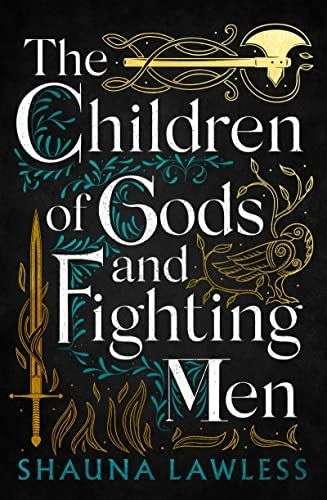THE CHILDREN OF GODS AND FIGHTING MEN by Shauna Lawless
Head of Zeus, hardback, £20.00
Reviewed by Stephen Frame

The Children of Gods and Fighting Men is set in 10th-century Ireland, where Gormflaith, one of the last of the Fomorians, an immortal race of fire-magic wielders, lives in secret amongst the humans. The Formorians are hunted by the Tuatha De Danann, a second magical race dwelling in hidden exile from humanity, only sending out select individuals to gather intelligence on the mortals. Fodla is one of the Tuatha De Danann tasked with spying on Brian Boru, one of the men who seek to be the High King of Ireland.
It is the story of these two women; Gormflaith, who plots, schemes and, in need, murders to elevate her son to kingship, and Fodla, who is desperate to stop the war she sees coming to Ireland. This is a story rich in historical detail and Irish myth, at a period when the Vikings maintained a strong presence in Ireland and Christianity sat alongside far older religions. It is told from the first-person point of view of both Gormflaith and Fodla, lending intimacy to the narrative. Much of the action is taken up with the intrigues within and between the various kingdoms of Ireland and how the two women are, by turns, drawn into them, trapped by them or actively pursuing them. It makes for a complex, intertwined story, perhaps overly heavy with secondary characters at times, drawing attention away from the two main characters. It’s a story that needs some work to follow, but it is rewarding all the same. The fantasy element is fairly light, limited to occasional uses of magic to move the plot along. More is made of the otherness of the Formorians and the Tuatha De Danann and how they deal with humans, and this works well in the novel.
What doesn’t work so well are the main characters themselves, particularly Fodla. Gormflaith is ruthless, vicious, cruel and cold, yet still fairly enjoyable as a strong woman determined to have her way in what is very much a male-dominated culture. Fodla is good-natured and seeks peace but manages to come across as weak and hesitant on too many occasions, leaving me struggling to connect with her. This isn’t helped by the whole of the book reading very much as the opening act of a series (which, to be fair, the blurb does promise). But everything feels as if it takes too long to get going. Despite there being treachery, battles, selfish kings, petulant princes and the occasional good man, the whole affair is strangely bloodless.

